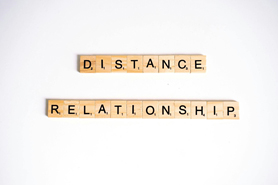
Long-distance relationships are those in which the people involved do not share a nearby physical space, but are separated by a considerable geographical distance. This dynamic can occur in various contexts, such as romantic relationships, friendships, or even in a professional setting.
Long-distance relationships have existed for centuries, but in recent decades, with the advancement of technology, they have undergone a significant transformation. Access to communication tools like video calls, social media, and instant messaging has facilitated constant communication, making it so that in some cases, the distance does not feel as profound.
However, despite the technological advantages, long-distance relationships can still be challenging. The lack of physical contact, time zone differences, expectations, and emotional difficulties can test the trust, patience, and commitment of the people involved.
For a long-distance relationship to be successful, it is necessary to cultivate effective communication, establish clear expectations, and have a strong desire to maintain the connection despite the difficulties.
In this context, long-distance relationships are not necessarily more difficult than those that develop with physical proximity, but they do require a different approach and a set of skills to overcome the inherent obstacles of distance.
Characteristics of a Long-Distance Relationship
As we know, romantic relationships involve a series of components that everyone must nurture for the relationship to be successful and healthy: commitment, trust, time, planning… In addition to all of the above, in long-distance relationships, there is the added challenge that, being geographically separated, physical contact cannot be maintained regularly, which presents some inconveniences that will need to be addressed.
The most relevant characteristics of this type of relationship that we must be clear about in order to assess whether we want a long-distance partner are:
- Digital communication: Couples will rely on some kind of tool to maintain contact, so it’s important to be aware that most communication will take place online.
- Limited interaction: The challenge of separation means a lack of in-person meetings, so couples will need to find other ways to emotionally connect.
- Emotional challenges: Distance can generate feelings of loneliness, insecurity, and jealousy, which will require conscious emotional management.
- Commitment and trust: As in any relationship, trust and commitment are key elements. In a long-distance relationship, this will be no different, and the demonstration of these components will be the responsibility of both partners.
- Planning for the future: Distance will be part of a phase in the relationship. For this reason, communication is crucial to establish concrete goals and plans (when the distance might end, how to manage it…).
Despite this, long-distance relationships can offer opportunities, such as strengthening the bond between partners or providing a chance for personal growth. It will be important to focus on what worries us so that we can manage it in the best possible way. At the Institute, we are a team of psychologists in Palma de Mallorca who will be happy to help you through the process and offer you the services we have at your disposal.
What challenges do I face in a long-distance relationship? What strategies can I use?
Long-distance relationships present a series of unique challenges that can test the emotional connection and communication between partners. Some of the most common difficulties include:
Limited communication
93% of our communication is non-verbal (gestures, tone of voice, body language…). The lack of physical interaction can make effective communication more difficult. Text messages or calls may lead to misunderstandings since visual context and body language are missing.
This is why open, fluid, constant, and face-to-face communication is very important to avoid subjective interpretations and strengthen the feeling of closeness. A useful strategy would be to agree on schedules to help stay connected.
Physical support
Not being able to be present during important or difficult moments can be painful. The absence of in-person emotional support may make one or both partners feel lonely. Additionally, distance can intensify any jealousy or insecurities, leading to questions about fidelity or commitment. To avoid this discomfort, it’s important to make an effort to organize regular visits if possible, to strengthen emotional connection or share online experiences (watching movies together, cooking at the same time, or even organizing “virtual dates”).
Expressing emotional needs
Openly talking about the need for physical support, explaining how you feel, showing honesty, clarity about insecurities, feelings, and expectations can help both partners understand the importance of finding ways to connect, avoid misunderstandings, and foster trust. Furthermore, discussing when and how to close the distance can provide a sense of direction and purpose. Having clear goals helps maintain motivation in the relationship.
Encouraging independence
A long-distance relationship involves more moments of loneliness than is typical. While working on connection, it is important to foster personal independence. Finding activities that keep you active and enrich you can help reduce feelings of loneliness.
Red Flags in a Long-Distance Relationship: What NOT to Do
Long-distance relationships require a different effort and sacrifice compared to “normal” relationships. For this reason, it is essential to be aware of the things that should not be neglected:
- Ignoring communication: The need for regular conversation can lead to emotional disconnection. Open and constant dialogue is important.
- Expressing insecurity destructively: Accusing without evidence or interpreting situations subjectively can create distrust and conflict. Ask objective questions about what happened and provide constructive feedback.
- Failing to address conflicts or problems as they arise can lead to a buildup of resentment. Honest communication is key.
- Comparing your relationship with others, especially if they are in-person relationships, can generate insecurity and frustration. Every relationship is unique and different.
- Disconnecting from your personal life and neglecting your friends or personal activities can create unhealthy dependency. It’s important to maintain a balance between personal life and the relationship.
In short, how do you know if a long-distance relationship is working?
Avoiding red flags can help strengthen the long-distance relationship and create an environment of trust and connection. Additionally, confirming that different strategies are being used, such as communication routines, future plans together, positive feedback, adaptability, and mutual support, will be essential for the success of any relationship, especially when distance is involved.
If you have questions about your particular case, you can contact us to request information about our couples therapy.
Arancha Lorente
Psychologist Col. No. B-03674











